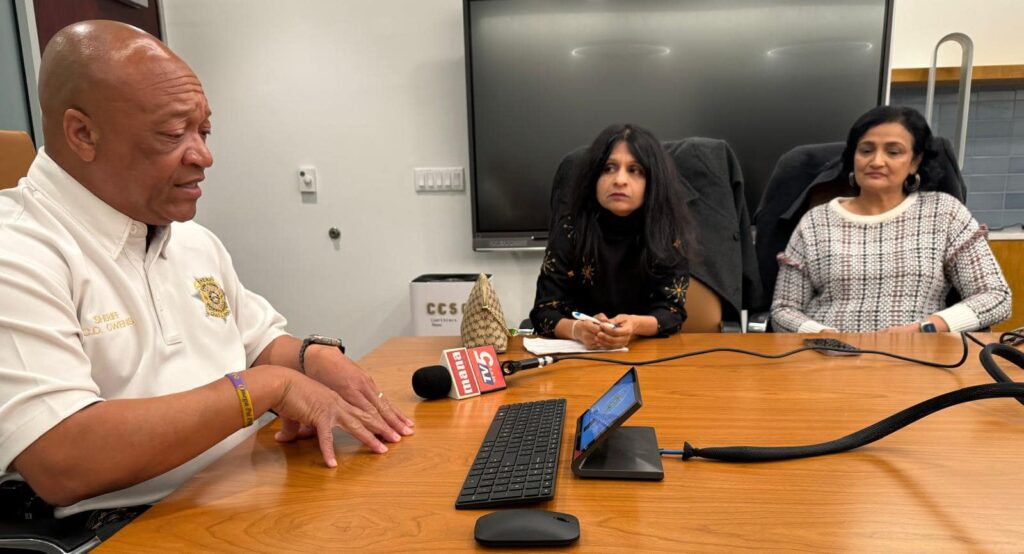BY JYOTHSNA HEGDE
Atlanta, GA, April 25, 2024: The United States incarcerates nearly two million people, with one of the highest incarceration rates in the world. Most people who are incarcerated are held in jails and prisons across the country. “The words“jail” and “prison” are often used interchangeably, but they are very different types of facilities,” explained Cobb County Sheriff Craig Ownes at a press meet on April 6, 2024. The interview was facilitated by Kartik Bhatt, Georgia Board of Examiners for the Certification of Water and Wastewater Treatment.
Sheriff Owens explained the broader jurisdiction and independence of his office, and highlighted the need for collaboration with other agencies to address illegal immigration and drug-related issues. He also stressed on the importance of mental health (of inmates) and spoke about the various initiatives by his office to address the issue.
The Sheriff also spoke about the importance of community involvement in enhancing public safety, leveraging resources such as equestrian units to patrol trails and large open areas, dogs, technology such as drones, and different programs for different types of offenders. He discussed diversity and cultural challenges in law enforcement along with recruiting and retaining diverse officers and the need for specialized retention strategies.

Members of the press were given a short tour of part of the facility. The impeccably maintained space, we were told, was cleaned by the inmates. Jail is a pretrial facility and encompasses approximately one million square feet under one roof. The original jail (Building A) was completed in 1987. It was expanded (Building B) in 1997. The most recent expansion – C Tower was completed in 2010. The total bed capacity for A, B and C Tower is 3,077, out of which, Sheriff Owens said 2080 are occupied.
In February this year, Cobb County Sheriff’s Office was honored by the Georgia Senate in recognition of receiving the prestigious Triple Crown Award from the National Sheriffs’ Association. This accolade is granted to fewer than 100 sheriff’s offices across the nation, which makes it a rare and significant accomplishment for Sheriff Owens and his team.
The Cobb County Sheriff’s Office is a law enforcement agency mandated by the Constitution of the State of Georgia, that executes a broad range of services which include but are not limited to Jail Operations, Court Security, Criminal Warrant Execution, Civil Process Service, Mental Health Transports, Forgery/Fraud Investigation, and Fugitive Investigation and Apprehension.
Craig Owens created history when he was sworn-in as Cobb Sheriff as the first African American sheriff in Cobb County. His win over incumbent Republicans also signaled a seismic shift in the county’s politics. An Army veteran, Owens, ran on his experience as a command sergeant major in the Army Reserve. Per his bio, he led a division of 14,000 personnel across 34 states and managed a budget of $51 million in the position. Running on a platform of truth, trust, and transparency, he won the Democratic nomination outright and then went on to overtake an entrenched incumbent by earning 55.24% of the vote. Sheriff Owens is a graduate of the FBI National Academy Class #225. He holds a bachelor’s degree in criminal justice from Saint Leo University and a Master’s Degree in Public Administration from Columbus State University, a Managerial Certification from the State of Georgia (GPSTC #PA04080032S), and a Local Government Management Certification from the University of Georgia Carl Vinson Institute.
Sheriff Owens is married to his high school sweetheart Sharon Owens. They reside in Mableton, GA where they raised three children and now enjoy spending time with their grandchildren.
Ownes leads a staff of more than 800 deputies and civilians. Under his leadership, the Sheriff’s Office has the most diverse command staff in its nearly 200-year history.

Some of the sweeping changes at the Cobb County Sheriff’s Office he mentioned include (but not limited to) beginning renovations at the jail, equipping every deputy with a body camera, beefing up mental healthcare for inmates, taking a more proactive approach to enforcing the law, more aggressive community outreach, and review and amendment of employee pay for equity’s sake. The Triple Crown rating, obtained by accreditation from the top three law enforcement credentialing authorities in the country – Commission on Accreditation for Law Enforcement Agencies (CALEA), American Correctional Association (ACA), and the National Commission on Correctional Health Care (NCCHC) bears testament to his leadership and teamwork from the staff. Sheriff Ownes expressed appreciation for the hardworking employees, partners, and stakeholders who contributed to this remarkable achievement.
‘Sheriff’ is a word derived from the Old English concept of ‘shire reeve,’ a man who took care of the interests of the King in a shire or district. Police is a word that has its origins in 1700s, which referred to local law enforcement.
What is the main difference between the police and a sheriff’s department?
“The Sheriff’s office has been established by the State Constitution. The duties and responsibilities of the Sheriff’s office are outlined in the Constitution. On the other hand, a police dept has been established under municipal regulations. While sheriffs are elected officials, police chiefs are appointed,” Sheriff Owens elaborated. He also highlighted other differences such as areas of jurisdiction. While the sheriff’s office is a law-enforcing agency that looks after law enforcement of jail services pertaining to a county or subdivisions in a state, the police dept looks after law enforcement in a specific city, municipality, town or village. Another noticeable difference, he said, is that while the police dept handles all city calls (such as 911) and other calls that pertain to their jurisdiction limits, the sheriff’s dept handles all calls from the county.
The words“jail” and “prison”are often used interchangeably. How do they differ from each other?
“Jails are usually local facilities under the jurisdiction of a city, local district, or county. They are short-term holding facilities for the newly arrested and those awaiting trial or sentencing (not convicted),” Sheriff Ownes explained. Those sentenced to serve a small amount of time (less than a year) may be housed in the local jail for the duration of their sentence. “Prisons are institutional facilities under the jurisdiction of the state or federal government where convicted offenders serve longer sentences.”
“I can tell you that this year’s office compound is one of the most diverse offices in metro Atlanta, Georgia, not only in terms of race but gender as well,” Sheriff Ownes said addressing questions about cultural diversity. “We have about 24% of our females that are in leadership positions,” he said, adding that his team “should be reflection of our communities in Cobb County”. While he admitted that “it’s hard to recruit some(communities) into this profession,” his team does its best to be diverse.
Recruitment and retention have been issues and law enforcement agencies across the country are struggling to fill vacancies. But Cobb County Sheriff’s office has fewer than 20 openings. How did that happen?

“We’ve been very successful and fortunate to have one of the lowest vacancy rates in metro Atlanta, if not the whole state of Georgia, for an agency comparable of this size,” Sheriff Owens said. The scene wasn’t always this green. But along with benefits packages and hiring bonuses, he added, “rebranding the work culture” and usage of latest technology and constantly upgrading equipment, like the stab-proof and protective vests for deputies working in the county jail, including a two-way body cam system that only four other law enforcement agencies in the country have to keep deputies safer have helped. The two-way camera and speaker system allows officers to connect directly with medical and mental health professionals during a crisis in the jail.
“It allows our deputies to push their side button and alert a supervisor or doctor and they can see exactly what they see and talk back and forth with them,” Sheriff Owens explained. Aggressive strategies such as recruiting near and far with promotional videos and billboards have broadened possibilities. Other protective efforts for officers working in the county jail include the development of a Critical Response Team, which works to seize contraband and respond to jail emergencies, including riots.
“I may be one of the first in the metro to hire a retention specialist,” Sheriff Owens noted. If someone wants to leave, the retention specialist finds out why and sees if something needs to be changed in order to keep them. He also added support services for the deputies, such as a wellness room where they can take a break and clear their heads.
According to the National Alliance on Mental Illness (NAMI), 70% of youth in the juvenile justice system have a diagnosable mental health condition. Young people in detention are more likely to suffer from psychosis.
NAMI Georgia offers a free, weekly support group for Cobb and metro Atlanta families who have an incarcerated loved one experiencing mental health challenges. The group meets online Tuesdays from 7-8:30 p.m. For more information about suicide and mental health rates, please visit the website for the National Alliance on Mental Illness (NAMI) at: https://namiga.org/
Friends and loved ones of detainees who have expressed thoughts of suicide or depression should immediately call the Adult Detention Center Watch Commander at (770) 499-4212 so that staff can notify medical professionals.
What about the mental health of inmates at Cobb Adult Detention Center?
Cobb County Sheriff’s Office has gained a reputation for its commitment to mental health services. Under Owens, the Office has aggressively increased funding for mental health services for detainees, including providing 24/7 access to mental health support. The agency recently became the first in Georgia and only one of two nationally to implement the latest body camera technology, which allows for two-way communication between a person who is having a mental health episode and a mental health provider. Sheriff Owens is continuing to review policies and seek out programs to provide detainees with the emotional and medical support they need.
Currently there are 13 facilities in the U.S. that hold the NCCHC Mental Health Accreditation, including the Cobb County Sheriff’s Office. In addition, the Cobb County Sheriff’s Office will be the second agency in the country to have partnered with Wellpath, which currently holds this particular accreditation. Post a string of inmate deaths in the facility prior to his taking office, some tied to mental health crises, the pressure to address the issue escalated. Prior to the program, the sheriff’s office did not have any in-house mental health staff members, and outside resources weren’t available 24/7. Along with psychiatrists and a nursing team, Wellpath’s physicians will also put an increased emphasis on conditions which are more common among inmates — substance abuse, recovery, and suicide. “My administration is centered around recognizing the humanity of all in our custody and care,” Sheriff Owens said.
The Sheriff’s Office unveiled GED Training Center in March of this year. The initiative empowers detainees with education opportunities offering onsite testing in a familiar environment. Launched under The ReAlign ReStart Program in July 2022, the GED initiative addresses the pressing need for detainees to acquire employable skills, enhancing their prospects for successful reintegration into the workforce upon release.
Sheriff Owens also spoke about the new Drone Unit and the swearing in of horses to the Mounted Patrol Unit. How do these units add value? These units help patrol local parks, trails, and high-capacity events including large crowds such as The Battery, Sheriff Owens observed. “It gives our deputies a higher vantage point when they’re out in large crowds.” The Sheriff’s Office also maintains canines of various disciplines including narcotics detection, explosives detection, tracking, and apprehension. The canines are utilized by specially trained and certified handlers. Canines are responsible for weekly sweeps of the Judicial Complex for explosives, Braves games and stadium security. The K-9 unit routinely assist other agencies both inside and out of Cobb County with tracking of missing or lost persons. “We are going to do everything in our power to try to increase public safety.”
When asked about the issue of Squatters who illegally reside on a property that they do not own, Sheriff Owens said a new law on the horizon (that has not been passed yet ) should address the issue and help home owners claim their property much easily and faster. Legislators are yet to vote on The Georgia Squatter Reform Act. The proposed law makes it clear that squatting is a crime to be handled by police. House Bill 1017 would create the offense of unlawful squatting when someone enters and resides upon the land or premises of the owner without the owner or rightful occupant’s knowledge or consent. While the Sheriff has the authority to evict the squatter, the right process to reclaim involves creating and notarizing an affidavit of intruder, which lays out a good-faith claim that the squatter has no legal claim to the property. When this is presented to the county sheriff he will evict the squatter on the spot. Georgia code Section 44-11-30, empowers homeowners to reclaim their property from intruders who wrongfully occupy it.
Does the Sheriff’s office work with ICE to address illegal immigration? Yes, Sheriff Owens said. “Our office had a MOU with ICE. We are not providing them deputies to work with them every day to do their administrative paper work. We never stopped doing what the law states. There is a state law in place that requires us to retain and report illegal immigrants to ICE and then they will make the decision to hold/retain/deport them. That decision is theirs not ours. We have always complied with that and still do. We retain and report illegal immigrants as per the law.”
“Community Engagement is at the core of our work at the Cobb County Sheriff’s Office,” Sheriff Owens said. His Community Engagement team works closely with churches and other religious groups, civic organizations, schools, and others to strengthen ties and restore trust between the community and law enforcement. Towards that goal, the office will host a community briefing providing the opportunity for the public to hear from Sheriff Ownes and his command staff on what the office is doing to serve the public. The event will be held on April 30, horses and K-9s 4:30-6pm; Program: 6pm at the Cobb Civic Center. Thise interested to learn more are welcome to attend.





